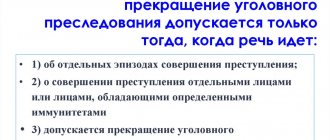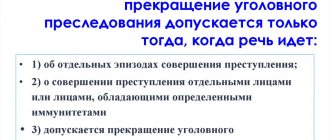To save effort, time and money in the fight against crime, the legislator provides a special procedure for considering a criminal case in court .
This is a special procedure, the approval of which requires the personal consent of the person with the charges brought against him.
The special procedure significantly speeds up the judicial process. However, it also has disadvantages that it is important for the accused to know about before making a decision .
Characteristics of a special procedure for trial
A special procedure in a criminal case is a specific proceeding that is carried out in the court of first instance.
It is characterized by legal relations and activities of participants aimed at establishing a person’s guilt in committing a crime in a shortened judicial investigation.
The leading role in the process is assigned to the magistrate or district court.
Tasks
The main objectives of the special procedure for considering a criminal case in court are:
- simplifying the nature of criminal proceedings in court;
- speeding up the criminal process at the trial stages from the moment the prosecutor brings the case to court;
- reducing the workload on magistrates and district judges.
Since the person fully admits his guilt, the court has the opportunity to impose a reasonable and legal punishment without establishing the specific circumstances of the crime.
This relieves judges, allowing them to focus on considering more complex and voluminous criminal cases that cannot be considered in a special order.
Reasons for use
The conditions under which a special procedure is approved in a criminal case are listed in Part 1 of Art. 314 Code of Criminal Procedure of the Russian Federation . These include:
- consent of the accused, victim and prosecutor to pronounce a sentence without a trial;
- a clear understanding by the accused of the nature of the application of the special procedure and the consequences to which this will lead;
- consideration only of those cases in which the maximum punishment does not exceed 10 years of imprisonment;
- the presence of comprehensive evidence of the legality and validity of the accusation;
- lack of grounds to terminate the case.
The judge must make sure that the evidence collected is sufficient to confirm the citizen's involvement in the crime. If he has doubts, he will not be able to pronounce a guilty verdict even if the defendant pleads guilty.
Stages of consideration of a case in a special order
The special procedure for trial is regulated by Art. 316 Code of Criminal Procedure. It includes several stages.
Stage No. 1: Preparation for the court hearing
Before the start of the hearing, the judge is obliged to establish that the accused voluntarily agreed to have his case examined in a special manner, received advice from a professional defense lawyer and was fully aware of the essence, nature and consequences of his decision.
It is not necessary to submit a petition with this request.
If the court, at the preparatory stage, reveals violations of the requirements for filing a petition or determines that the accused or prosecutor opposes the special order, its approval will be denied. In this case, the judicial investigation will proceed as usual.
Stage No. 2: Conducting a court hearing
The legislator does not establish clear rules on the composition of the court, which should conduct proceedings in a special manner.
Therefore, in theory, a situation is possible in which the accused makes two requests at once - for the introduction of a special procedure and for a collegial hearing of the case with the participation of three federal judges.
This is possible, since such a composition, according to clause 3, part 2, art. 31 of the Code of Criminal Procedure of the Russian Federation, has the right to resolve criminal cases of grave and especially grave crimes. However, in practice such situations are extremely rare.
When considering a case in a special manner in accordance with Part 1 of Art. 31 of the Code of Criminal Procedure of the Russian Federation, the court hearing takes place in the mode that is established in the court of first instance.
However, the procedure has its own characteristics:
- Mandatory presence of the accused and his defense attorney or lawyer . The rule described in Part 4 of Art. is excluded. 247 Code of Criminal Procedure of the Russian Federation. It states that proceedings in a case of medium or minor gravity can be carried out without the presence of the accused in the courtroom if he has filed a corresponding request.
- Mandatory participation of a public or private prosecutor . He must speak first, outlining the essence of the charges brought against him.
- Interviewing the defendant and the victim . It is necessary to establish whether they understand the essence of the charges brought, whether they agree with them, and whether they support the previously filed petition to apply a special procedure for considering the case.
- The court's determination of the fact of notification of the victim about the time and place of the hearing is carried out in the event of his absence in the courtroom.
Since there is no judicial investigation, the judge does not evaluate the available evidence. However, the law requires compliance with the general rules for imposing a fair punishment. Therefore, at the initiative of the parties, the evidence is still examined.
In addition, it is possible to study data characterizing the personality of the defendant, mitigating and aggravating circumstances . For this purpose, witnesses are questioned and documents are examined.
The process ends with court arguments and the final word of the accused.
Stage No. 3: The verdict and its appeal
Consideration of the case in a special manner provides for the proclamation of a guilty verdict . On the other hand, in Chap. 40 of the Code of Criminal Procedure of the Russian Federation there are no rules that prohibit making other decisions.
Therefore, in order to pronounce a guilty verdict, the judge must form a firm internal conviction of the defendant’s guilt. It can only be based on consideration of the case materials and evidence, and not on guesswork.
If the court has doubts about the guilt of the defendant , it must make a decision to terminate the consideration of the case in a special manner. A trial will be scheduled according to general rules, during which the collected evidence will be examined.
This is necessary for an acquittal.
The special procedure for considering a criminal case provides for more lenient sanctions : up to 2/3 of the maximum term of imprisonment or the amount of the most severe punishment.
After pronouncing the verdict, the judge explains to the defendant the possibility of appealing it through the appellate or cassation procedure.
In Art. 317 of the Code of Criminal Procedure of the Russian Federation establishes only one restriction . An appeal is impossible due to the discrepancy between the judge’s conclusions contained in the verdict and the actual circumstances of the case, which are established by the court of first instance or appellate instance.
Commentary on Article 316 of the Code of Criminal Procedure of the Russian Federation
1. When assigning a punishment to a convicted person in a case considered in a special order, it is necessary to apply a set of rules: firstly, on the imposition of a punishment not related to imprisonment for a crime of minor gravity, i.e. on fulfilling the requirement of Part 1 of Art. 56 of the Criminal Code on the impossibility of imposing imprisonment; secondly, about taking into account the rule of Part 5 of Art. 62 of the Criminal Code, i.e. on the calculation of two thirds (and in the case specified in Article 226.9 of the Code of Criminal Procedure - one second) not of the term of imprisonment, but of the term (size) of the next most severe punishment from among those specified in the sanction of the article of the Criminal Code. In Part 5 of Art. 62 of the Criminal Code limits the upper limit of the term of the most severe punishment for a crime committed (and not the upper limit of the most severe punishment specified in the sanction of the article of the Criminal Code), which is explained in paragraph 13 of the Resolution of the Plenum of the Supreme Court of the Russian Federation of December 5, 2006 N 60 “On the application by courts special procedure for the trial of criminal cases" (as amended by the Resolution of the Plenum of June 5, 2012). When imposing punishment in such cases, additional reference to Part 7 of the commented article is not required <1614>. ——————————— <1614> See: Answers to questions received from the courts on the application of Federal Laws of March 7, 2011 N 26-FZ “On Amendments to the Criminal Code of the Russian Federation” and from December 7, 2011 N 420-FZ “On amendments to the Criminal Code of the Russian Federation and certain legislative acts of the Russian Federation”, approved by the Presidium of the Supreme Court of the Russian Federation on June 27, 2012 // Bulletin of the Supreme Court of the Russian Federation. 2012. N 11.
2. Specified in Part 5 of Art. 62 of the Criminal Code and in part 7 of the commented article the requirement to assign to the defendant, when considering a case in a special procedure, a punishment of no more than two-thirds (and in the case specified in Article 226.9 of the Code of Criminal Procedure - one second) of the maximum term or amount of the most severe type of punishment provided for for the crime committed, do not apply to additional punishments <1615>. ——————————— <1615> See: Resolution of the Plenum of the Supreme Court of the Russian Federation of December 5, 2006 N 60 “On the application by courts of a special procedure for the trial of criminal cases” // Bulletin of the Supreme Court of the Russian Federation. 2007. N 2.
3. See also the contents and commentary to Art. Art. 42, 131, 234 - 272, 281, 292 - 314, 317.7, 389.1 - 389.19 Code of Criminal Procedure of Russia.
Agreement on cooperation (pre-trial)
The defense and prosecution parties may enter into a special cooperation agreement . It agrees on the conditions of liability of the accused (suspect) when he commits certain actions from the moment a criminal case is initiated or charges are brought.
The Criminal Procedure Law imposes the following requirements for filing a motion to enter into an agreement:
- filing a petition by the accused (suspect) in writing with the signature of a defense attorney or lawyer;
- application within a certain period - from the start of criminal prosecution to the completion of the preliminary investigation;
- the presence in the petition of information about what actions the accused (suspect) undertakes to perform to facilitate the investigation, reveal the identities of accomplices, and search for missing property.
The prosecutor must consider the petition within three days and make a decision to satisfy it or refuse to satisfy it.
If a positive decision is made, then after the end of the preliminary investigation, the prosecutor issues a resolution confirming that the accused has fulfilled his obligations.
This document, together with the criminal case, is then sent to the court, where the issue of approving a special procedure for trial is decided.
Another comment on Art. 316 Criminal Procedure Code of the Russian Federation
1. A court hearing at the defendant’s request to apply a special trial procedure begins with the court examining the grounds for satisfying the stated request (see Article 314 and the commentary thereto). Since the participation of the victim in the court hearing is not mandatory, his attitude towards the stated petition can be established on the basis of a written statement.
2. The special procedure for trial is terminated if obstacles to its conduct are identified at the court hearing (violation of the procedure for filing a motion, objections from the prosecution). In addition, the judge is obliged, on his own initiative, to issue a resolution to terminate the special procedure of the trial and order the consideration of the criminal case in the general procedure if, before the verdict is passed, circumstances are established that impede a conviction, or grounds for changing the classification of the offense or terminating the criminal case or acquittal of the defendant.
3. The punishment imposed by the court on the defendant in the case of applying a special procedure for trial should not exceed two-thirds of the maximum term or amount of the most severe type of punishment provided for the crime committed. The restrictions established by the commented article do not apply to cases where the defendant is assigned a less severe punishment or an additional punishment from those provided for in the relevant article of the Criminal Code, which can be applied by the court without additional restrictions. When passing a sentence, the court must take into account mitigating and aggravating circumstances, along with the general rule on imposing punishment in a special procedure of the trial.
Is it worth agreeing to a special procedure for considering the case?
For the USA, some European countries, India and Israel, the practice of considering cases in a special manner is not new. However, in Russia this criminal law institution appeared relatively recently, and in 2021 it still requires improvements.
Therefore, before making a decision, the accused must evaluate all the pros and cons of special consideration of the criminal case . No one has the right to force him to agree to such an order, since this is possible only on a voluntary basis.
Special advantages
The procedure does not have many advantages, but among them there are important ones for the accused, for judicial workers, and for the state:
- Sentence mitigation . The defendant receives a sentence that is at least 1/3 less than the maximum possible.
- Fast consideration of the case . Facilitates the work of judges and reduces the time the accused is held in custody.
- Saving procedural and material resources . Plus for the state, which bears the corresponding costs.
Disadvantages of the procedure
Among the disadvantages of trial in a special order are the following:
- The need to fully admit the accusation . In fact, this means agreeing with every word in the wording of the indictment.
- Inability to appeal the verdict in terms of the factual circumstances of the case . After it is passed, the accused will not be able to prove that he did not commit the crime.
A special procedure for considering a case in court has been used in Russia since 2009. It significantly speeds up court proceedings and facilitates the work of judges.
This procedure gives the accused the opportunity to ease their fate and achieve a more lenient punishment.
However, approval of a special order requires recognition and refusal of the opportunity to later “change your mind” and prove non-involvement in the crime.




